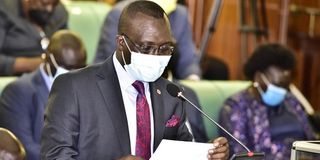Lack of coordination among EAC states causing trade disputes - Minister

The Minister of State for Foreign Affairs (Regional Affairs) John Mulimba. PHOTO | FILE | COURTESY
What you need to know:
- Ambassador Naimi Sweetie Aziz Hamza the Tanzanian director for Africa and Minister for Foreign Affairs said the meeting is following on the implementation of decisions which were agreed upon in the 2019 meeting in Tanzania as well as identify new areas of cooperation between the two countries.
The Ministry of Foreign Affairs has attributed the current fuel crisis and persistent trade disputes among East African Community members to absence of a permanent coordinating body to detect and resolve the disputes.
While opening a three-day meeting at Sheraton Hotel. Kampala between Uganda and Tanzania to discuss how far the two countries have implemented decisions that were agreed upon during the third session of the Joint Permanent Commission in Tanzania in 2019, John Mulimba, the state minister for Regional Affairs, attributed the current fuel crisis and persistent trade disputes with EAC, to lack of coordination mechanisms among EAC member states to implement decisions taken by joint permanent commissions.
“Non-tariff barriers will always be there and I want to relate them to the fuel crisis. We have identified the need to deepen coordination between ministries, departments and agencies (MDAs) in following up with the implementation of decisions taken during joint permanent commissions,” he said.
He explained that joint permanent commissions are fora where two countries come together to discuss matters that are bilateral and of mutual interest to deepen their bilateral relations. He said it is a joint business forum where countries discuss issues related to business, the hiccups that keep emerging and they have identified permanent focal persons in the MDAs to resolve such issues without necessarily waiting for joint permanent commissions.
Ambassador Naimi Sweetie Aziz Hamza the Tanzanian director for Africa and Minister for Foreign Affairs who led a delegation of ministers, permanent secretaries and senior government officials for the three- day meeting, said the meeting is following on the implementation of decisions which were agreed upon in the 2019 meeting in Tanzania as well as identify new areas of cooperation between the two countries.
Going forward
“We shall have meetings at the inter-ministerial level discussing issues of strategic projects in energy and transport. Tanzania is implementing the Standard Gauge Railway which is strategic for the region and the country. We are bringing new energy projects to the table and new areas of cooperation,” she said.
She added that they will also be discussing the developments in the implementation of the East African Oil and Gas Pipeline project where the two countries have already passed laws to engage a contractor to build the pipeline from Uganda to Tanga.
Among the issues to be discussed are the modalities of implementing decisions taken after political and diplomatic decisions of the two countries, joint action plans for combating illegal migrations, harmonised procedures and fees for work and resident permits, frameworks for cooperation on legal matters, regular border meetings to address cross-border challenges. They will also discuss issues related to free movement of labour, goods and services within the two countries.




